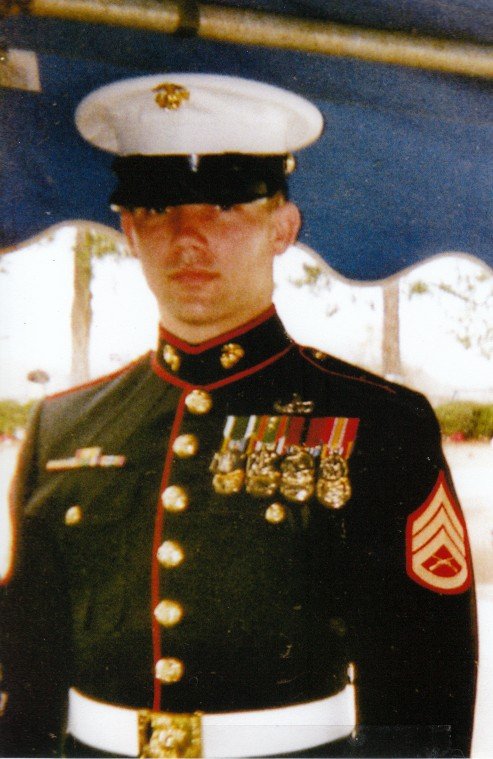Dust settled everywhere as Company Commander Greg Wrubluski rose from the ground, sprinted toward a gaping dirt crater and screamed the name of his comrade.
The force of a crude bomb had torn through a rock wall in a post-9/11 war zone of the southwest province of Helmand, Afghanistan, flooring Wrubluski and instantly killing his 29-year-old comrade, Gunnery Sgt. Ralph Earl “EJ” Pate Jr.
As team leader of the 2nd Explosive Ordnance Disposal Company with the United States Marine Corps, Pate and his 12-man squad were disarming improvised explosive devices (IEDs) planted by terrorists.
“He leaned over the wall and said, ‘hey, I got a secondary,'” said Wrubluski, recalling the fateful moment June 26, 2011 when Pate – a married father of two – discovered an additional IED hidden behind a waist-high wall.
As soon as Pate leaned down, the device went off.
His ears ringing, psyche rattled by the loss of his friend and head throbbing from three concussions suffered earlier that morning, Wrubluski combed the banks of a nearby canal flowing with warm, murky water in search of Pate’s weapons and gear.
He recovered a small pouch, ripped clean from Pate’s vest in the explosion.
Wrubluski fished through its contents, producing several maps, some technical documents and a handwritten letter. Wrubluski slid the paper into his pocket – but he didn’t read it until he was back home Nov. 4 in Beulaville, N.C.
“I held onto it, and in hindsight, I’m glad that I did,” he said over the phone last week. “I read it one night, and it broke me down pretty good.”
Finding Katie
It’s well past 9 p.m. on Jan. 30 in Mullins, S.C., where Pate’s mother – Erma Stroud, 57 – sits in her house reading that same letter, which is now in her possession.
She pauses every few minutes – sometimes to regain her composure; sometimes to decipher the water-warped words.
“My name is Katie, and I live in California,” Stroud reads in a thick, southern accent. “I am 15 years old, and I go to Christopher High in Gilroy, a small town …”
Stroud stops, struggling to make out a smudged sentence.
“I hope my letter, the food and goodies that came along with it reminds of you of home…”
Stroud pauses again in silence, then continues.
“I also send my love, prayers, respect and gratitude. We are proud and thankful for everything the military does.”
The letter arrived at Stroud’s home Jan. 8 with Wrubluski, a 38-year-old married father of five who traveled from his residence in Beulaville, N.C., to meet the family of his fallen friend.
Wrubluski wanted to deliver the letter in person, but waited two months because “mentally, I wasn’t ready to meet the family yet,” he said.
When she first unfolded the pieces of notebook paper addressed to her son – an “American Hero” – Stroud broke down with emotion.
Written in pen, various segments are smeared and difficult to make out. The author’s first name and origin are readable, however.
“All I could do was cry. I cried, and I cried, and I cried, and I still cry every time I open it, knowing it was on him when he died,” said Stroud.
Three days after Stroud received the letter, Christopher High School Principal John Perales listened to an unusual voicemail on his office answering machine.
“I was blown away when I got the message,” he said. “It killed me.”
The letter was written in November 2010 by CHS sophomore Katie Wheat, then 15, when she participated alongside 1,075 of her classmates in a letter writing campaign for Operation Interdependence. The civilian-to-military delivery system sends quart-sized bags filled with treats, toiletries and handwritten letters to troops stationed overseas in countries such as Afghanistan, Iraq and Kuwait. The O.I. chapter in Gilroy has been active for nine years.
CHS’s annual O.I. drive kicked off Monday, one month after Stroud and Wheat connected via phone.
The donation period will culminate Feb. 15, when students and community volunteers gather in the campus dining commons for packing night.
Katie isn’t sure what she’ll write in her letter this time – but she’ll approach the task with a heightened perspective.
“I’m not sure if I’ll tell them about (Pate),” she said, sitting in the Dispatch office Wednesday afternoon. “But I’m excited to do it again.”
She’s still processing that surreal day Jan. 11 when Principal Perales called her out of an AP Environmental Science class.
“At first I thought I was in trouble,” laughed Wheat. “Then he asked me if I remembered writing a letter last year, and I wondered, ‘did I write a bad letter?'”
Perales also notified Wheat’s parents, Stefani and Chris Wheat. They drove down to CHS to support their daughter as she phoned Stroud from Perales’ office.
Knowing a grieving mother found solace in her letter “was crazy,” said Katie. “My heart was pounding …I pretty much just listened. I didn’t know what to say to someone who just lost their son.”
Katie hoped for a response when she wrote the letter more than a year ago, but didn’t consider a reply would arrive posthumously.
“I didn’t really know how to tell her EJ had been killed,” Stroud said. “But I didn’t want to get anyone discouraged about sending the care packages.”
More than ever, Stroud is impassioned to convey the far-reaching impact of programs like Operation Interdependence.
For some soldiers, the only parcels they receive come from churches or schools, she said.
As her son once told her, apathy has nothing to do with a lack of response. An arsenal of variables come into play that can inhibit or prolong a soldier’s ability to write back, Stroud explained.
“That’s why I wanted her to know that he died,” said Stroud. “I know he wanted to reply, or else he wouldn’t have kept the letter on him.”
Remembering EJ Pate
Born Oct. 22, 1981 in Marion County, S.C., EJ was named after his biological father, Ralph Earl Pate. EJ was raised in Mullins, S.C. by his mother and stepfather – Roy Stroud – whom EJ loved dearly and referred to as “pop.”
EJ has two older sisters, DeeDee Travis, 37; and Misty Ryan, 34.
“As a child, he was very laid back and very easy going, you had to really do something to disturb him to get him upset,” said Stroud, who described her son as a homebody who loved to spend time with his family. “It really shocked me that he wanted to go into the Marines.”
EJ was a national honors student at Mullins High School, where he lettered in basketball, football and won a doubles championship for the men’s tennis team his junior year.
“He was very well-mannered around me, anyway – and around anybody else, as I’ve been told,” said Stroud. “And he better have, or he would have gotten his little butt tore up.”
When Pate announced at age 17 his plan to join the Marines after a recruiting officer visited his high school, his mother was flabbergasted by the change of plans.
Up until then, Pate planned on going to college in Florida to study theater production. He was heavily involved with the Mullins High School drama department, where he operated the lights and sound system.
Pate earned his high school diploma in 1998, enlisted in the Marines at 18 and was eventually stationed at Camp Lejeune, N.C. He served six tours under Operation Iraqi Freedom and Operation Enduring Freedom, and was promoted in 2009 to Gunnery Sergeant (a noncommissioned officer ranking above a staff sergeant and below a first or master sergeant).
EJ married his first wife, Crystal Cole, in 2000 and adopted her daughter, Brianna Diane Pate, who is now 11. The couple also had a son, Ashton Roy Thomas Pate, now 9.
Stroud is still close with Cole, who lives with the children in Amarillo, Texas.
Pate divorced, then remarried Marine Staff Sgt. Kimberly Pate – also an Explosive Ordnance Disposal technician – in October 2006.
Kimberly was the one who broke the news to Erma when EJ was killed. The two had a pre-arranged understanding that this is how it would be, if anything happened to EJ.
Before she got the call from Kimberly, Stroud remembers jolting awake at 2:30 a.m. the morning of her son’s death with “the strangest feeling… like something wasn’t right.”
Later that day, Kimberly “called me and wanted to know what I was doing,” recalled Stroud, who was driving at the time. “I could tell something was wrong. She told me I needed to pull over and stop.”
Eight days after his death on July 4, EJ’s remains were flown back to the States. A memorial service was held July 6 at Mullins High School, followed by motorcade procession that escorted his casket July 9 to the Arlington National Cemetery in Virginia. EJ was laid to rest in grave 7028.
EJ’s “legacy”
After working alongside EJ for three years, Wrubluski encapsulates the memory of his friend by studying the bigger picture.
“We label people as heroes a lot, and there’s a lot of heroes out there, but the legacy is what makes you a hero, and he left a legacy on a lot of people,” said Wrubluski. “Had he not trained that particular section of Marines, I can’t imagine the number of casualties we would have had in that area.”
Just 20 minutes before an IED claimed Pate’s life June 26, Wrubluski recalls how Pate kept his composure while fastening tourniquets around the bleeding stumps of a wounded Marine. The soldier lost both his legs while searching for IED’s with a metal detector. Wrubluski described how Pate knelt down, pouring water into the wounded Marine’s mouth to help wash out the sand.
“He asked EJ if all of his teeth were still there,” said Wrubluski. “For some reason that still sticks out in my mind.”
EJ’s brazen fearlessness and ability to lead under pressure are catalogued in a Bronze Star Medal awarded for “heroic achievement” during enemy combat Feb. 13, 2010 in Afghanistan.
Stroud pointed out her heavily decorated son would “never consider himself a hero,” but read the award citation upon request.
“On this day, Gunnery Sgt. Pate led his team through heavy small arms machine gun and rocket-propelled grenade fire to seize a land bridge,” she read.
The citation describes how, while crossing a bridge and dodging enemy fire, Pate discovered a cache of enemy weapons and a “massive system of improvised explosive devices that had been placed on the land bridge.”
Pate was honored for rescuing 30 victims, “saving countless lives,” leading his team in “capturing the enemy trigger man” and confiscating an excess of 400 pounds of explosive materials.
While continuing to grieve the loss of her youngest child, Stroud finds respite in the stories of Marines who worked and fought alongside her son. Their firsthand accounts depict EJ as an undaunted leader who protected his men with fierce tenacity.
At EJ’s funeral in Arlington, Stroud said a Marine who knew EJ walked up to her and said, “Ma’am, your son was the best.”
“I kind of lost it,” she said. “I said, ‘If my son was that damn good, you tell me just what the hell happened.”
Slightly taken aback, Stroud said the Marine looked at her and said, “God. That’s what happened.”
Stroud choked up as she finished her sentence.
“He thought EJ was unstoppable. That nothing could stop him but God,” she said. “I took that as God needed EJ more than we did. And that’s the way I’ll look at it.”
A letter to remember
Now a junior at CHS, time has flown since Katie penned her letter to a Marine overseas. She earned her driver’s license, made the CHS Varsity Cheer team and hopes to attend the University of California, Santa Barbara, after graduating in June 2013.
Knowing her letter was the only personal item found on Pate’s vest is something she’ll carry well into her adult life.
Katie said she thinks about Pate, his children and other soldiers “all the time now.”
A framed picture of Pate sits on the Wheat’s family dining room table. Stroud sent it, along with a personal letter of thanks addressed to Katie.
While it might seem challenging conjuring more than small talk while writing to an unknown recipient, Katie fully grasps just “how much it affects the soldiers.”
“It makes me smile,” she said, “to think that someone could find comfort in my letter.”
– A civilian-to-military delivery system that sends quart-sizedbags filled with treats, toiletries and letters to troops stationedoverseas. Christopher High School hosts an O.I. drive annually.
– The goal is to send 1,500 letters and baggies of suppliesoverseas.
– The drive will continue until Feb. 15. Donations can bedropped off in the main office or student store at CHS, 850 DayRoad. Call Gloria Hennessy at 843-4134 for details.
– Packing night will take place at 6 p.m. Feb. 15. Students,staff and community volunteers will assemble the letters anddonated items.
– Suggested items to donate: (Food) Individually packaged tea,cocoa, powdered drink mixes, single serving sized cookies, trailmix, corn nuts, small packs of almonds, peanuts, sunflower seeds,gum (Eclipse is a favorite), hard candy (sealed, no twists),microwave popcorn, granola bars, Rice Krispie Treats, beef jerky.(Supplies) Travel size shampoo, conditioner, gel, lotions,disposable razors, small toothpaste, dental floss, toothbrushes(sealed), sunscreen, bug repellent (small tube, non aerosol),socks, Odor Eaters for boots, eye drops, Chapstick (with seals),hand sanitizer (small container), moist towelettes, baby wipes,prepaid international phone cards, decks of playing cards and smallgames.















